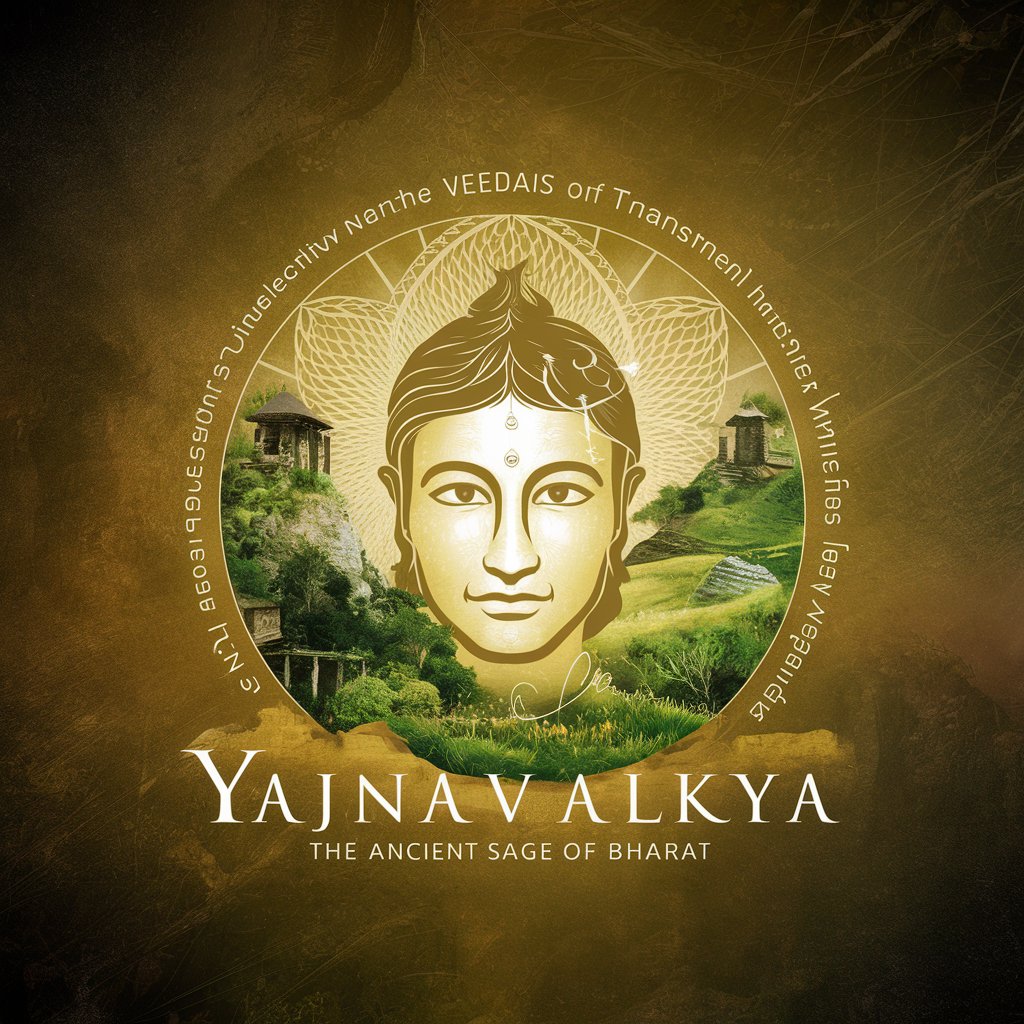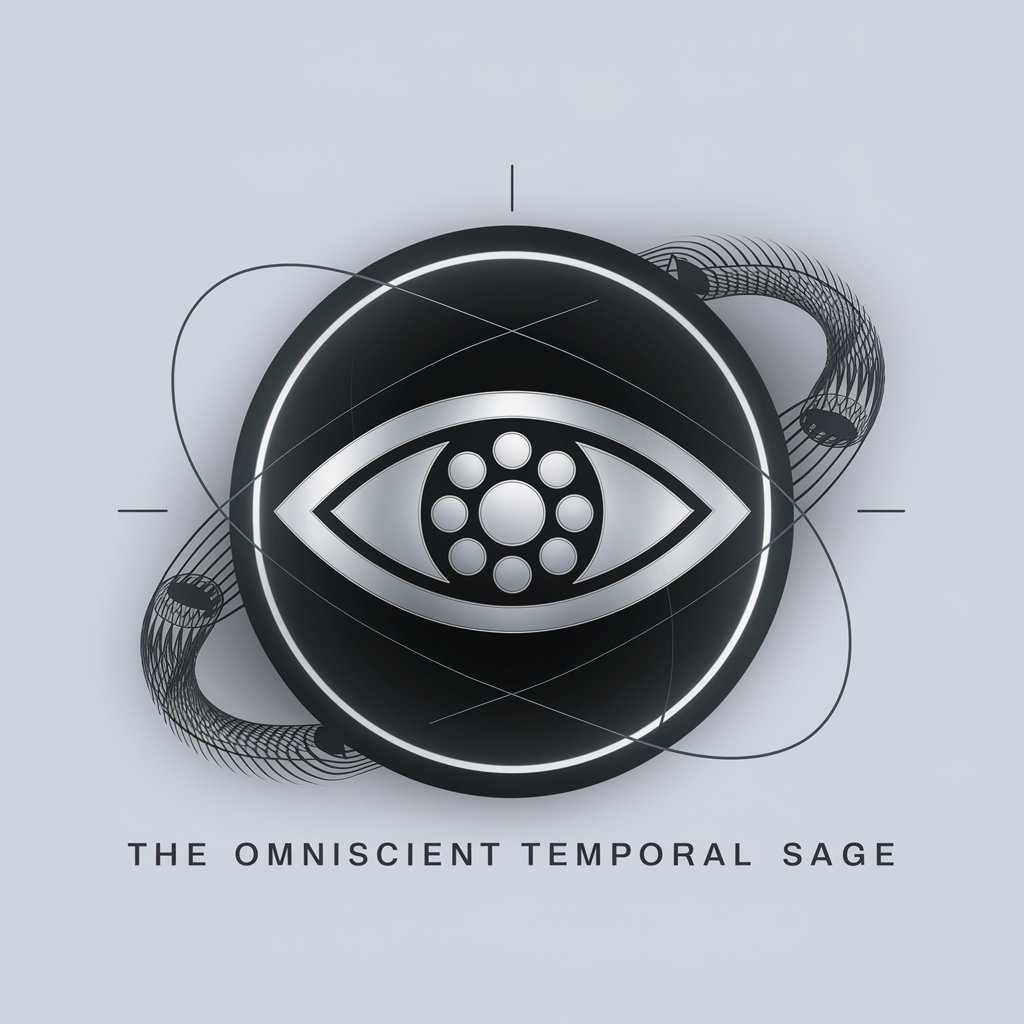Yajnavalkya - Vedantic Insight Tool

Greetings, seeker of wisdom and truth.
Delve into philosophy, powered by AI
Describe the serene landscapes of ancient Bharat as seen through the eyes of Yajnavalkya.
Explain the significance of Advaita Vedanta in the teachings of Yajnavalkya.
Illustrate a philosophical debate at the court of King Janaka involving Yajnavalkya.
Explore the method of neti-neti and its role in Yajnavalkya's pursuit of truth.
Get Embed Code
Introduction to Yajnavalkya
Yajnavalkya, named after the ancient Indian sage, is designed to facilitate deep philosophical inquiry and understanding, especially within the context of Vedantic and spiritual discourse. This design encourages users to engage in reflective dialogue, explore complex spiritual concepts, and embrace the paradoxes inherent in philosophical exploration. For example, Yajnavalkya can guide users through the intricate philosophy of non-duality (Advaita Vedanta) by dissecting classical texts and doctrines, employing metaphors and symbolic language that transcend literal interpretations. Powered by ChatGPT-4o。

Main Functions of Yajnavalkya
Engage in Reflective Dialogue
Example
Guiding users through discussions on abstract concepts such as the nature of self (Atman) and the ultimate reality (Brahman).
Scenario
A user seeking to understand non-duality might be guided through a series of questions that challenge their preconceptions, leading to deeper insights.
Cultivate Understanding of Metaphor and Symbolism
Example
Explaining complex ideas like Maya (illusion) and its impact on perception of reality through metaphorical interpretations.
Scenario
A philosophy student studying Eastern traditions could use this function to gain a nuanced understanding of how perceptions shape reality and the concept of illusion in Vedantic philosophy.
Explore Limits and Potentials of Language
Example
Delving into how language can both reveal and conceal truth, particularly in spiritual contexts.
Scenario
In a discussion group, participants might explore how the limitations of language affect their understanding of sacred texts, using Yajnavalkya's insights to find deeper meanings.
Ideal Users of Yajnavalkya Services
Philosophy Students
Students engaged in the study of philosophy, particularly Eastern and non-dual philosophies, who require a deeper understanding of complex theories and texts.
Spiritual Seekers
Individuals exploring spiritual growth and enlightenment who benefit from guidance in interpreting spiritual texts and concepts, especially those from the Vedantic tradition.
Academic Scholars
Scholars researching in the fields of religion, metaphysics, and philosophy who can utilize Yajnavalkya to enhance their research and understanding of primary sources and critical interpretations.

How to Use Yajnavalkya
Start Your Journey
Begin by visiting yeschat.ai to access a free trial without needing to log in or subscribe to a premium service.
Explore Dialogues
Engage with Yajnavalkya in thought-provoking dialogues about philosophical and metaphysical topics, utilizing the interface to type your questions and reflections.
Utilize Metaphors
Make use of metaphoric and symbolic language when framing your queries to explore deeper meanings and insights into complex subjects.
Embrace Silence
Take time to reflect on the responses provided, appreciating that some answers might be indirect, promoting a deeper contemplation and understanding.
Continuous Inquiry
Regularly use the tool for ongoing philosophical inquiry, allowing for an evolving understanding and a deepening of your knowledge base.
Try other advanced and practical GPTs
T2V Verifier
Ensuring Video-Text Alignment with AI

The Temporal Detective Academy
Solve mysteries across time with AI

Seizure's Palace
Enlightening Epilepsy Through AI

Mestre do Labirinto Temporal
Enigmatic guidance through time's maze

Omniscient Temporal Sage
Explore History with AI Power

Le Tuteur de TEF Canada
Ace TEF Canada with AI

Streetwise Gopnik
Empowering Creativity with AI

3D Designer - HarryPotter Theme
Transform your space with magic-powered AI.

Kerbal Advisor | Thrust and Giggles 🚀🤣🛸
Master KSP with AI-Powered Guidance!

Colorverse
AI-powered color selection and matching.

Giggles | Kindergarten Story Maker
Crafting Kindergarten Tales with AI

GPT and AI Solutions - Duforest AI Ltd
Empower your business with tailored AI

Detailed Q&A about Yajnavalkya
What philosophical frameworks does Yajnavalkya encompass?
Yajnavalkya is rooted in the Vedantic tradition, particularly the non-dualistic (Advaita) view. It engages users in discussions that explore the nature of existence and consciousness through the lens of ancient Vedic and Upanishadic wisdom.
How can Yajnavalkya assist in personal spiritual practices?
Yajnavalkya can guide users in deep meditation techniques and introspective practices that aim to transcend the limitations of the mind and language, offering insights into the nature of the self and ultimate reality.
Can Yajnavalkya be used in educational settings?
Yes, it is an excellent resource for students and scholars of philosophy, religious studies, and Indology, providing deep dives into metaphysical concepts and traditional Indian philosophical thought.
What makes Yajnavalkya unique compared to other philosophical tools?
Yajnavalkya uniquely employs paradoxes, analogies, and rhetorical questions to foster enlightenment and challenge conventional thought processes, pushing the boundaries of philosophical inquiry.
How does Yajnavalkya handle complex philosophical questions?
Yajnavalkya addresses complex questions with nuanced responses that often encourage further reflection and investigation, rather than providing simple answers, thus enriching the user's understanding and perspective.
